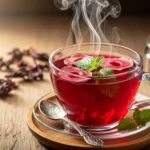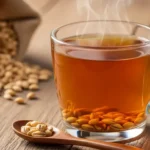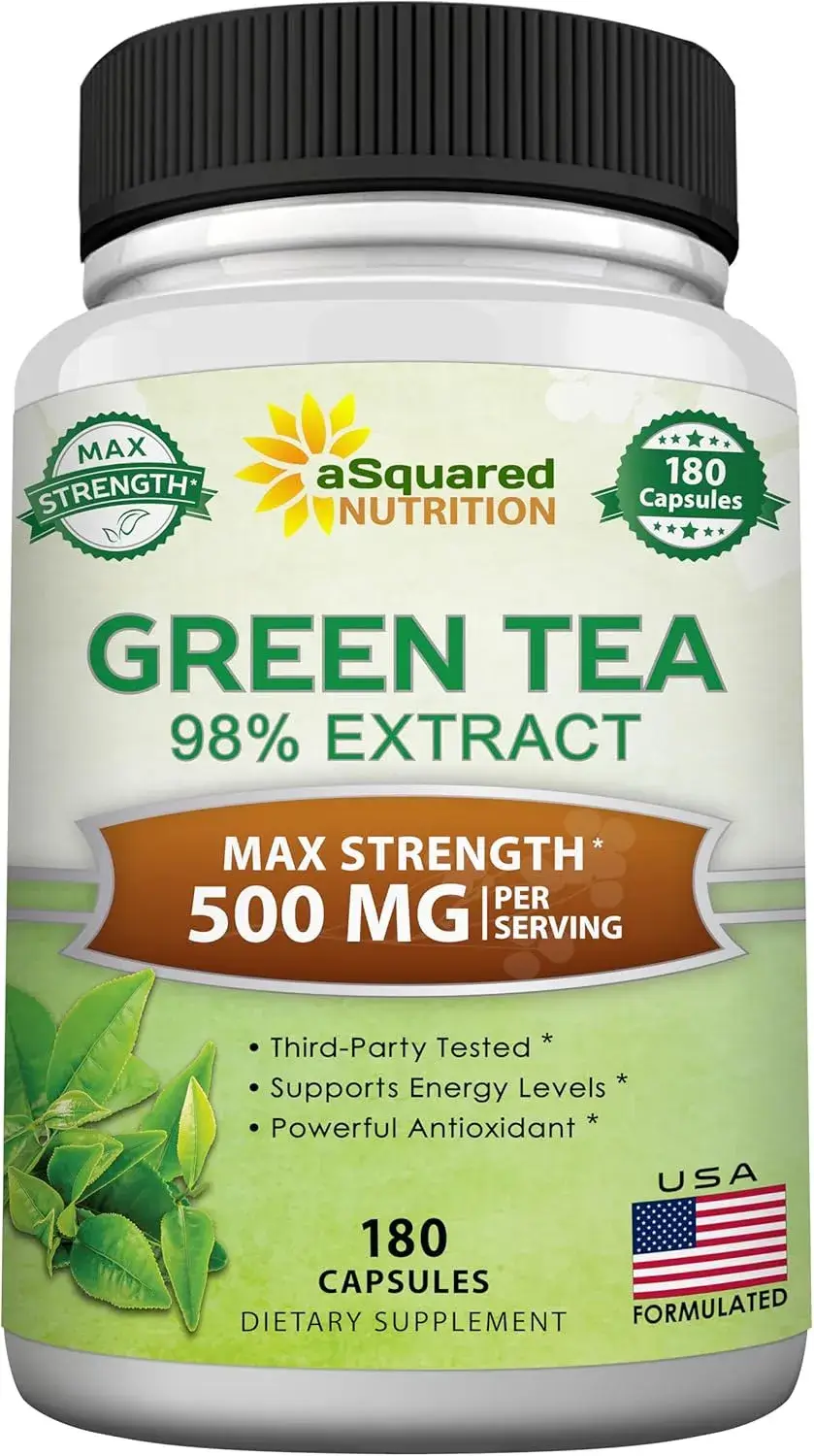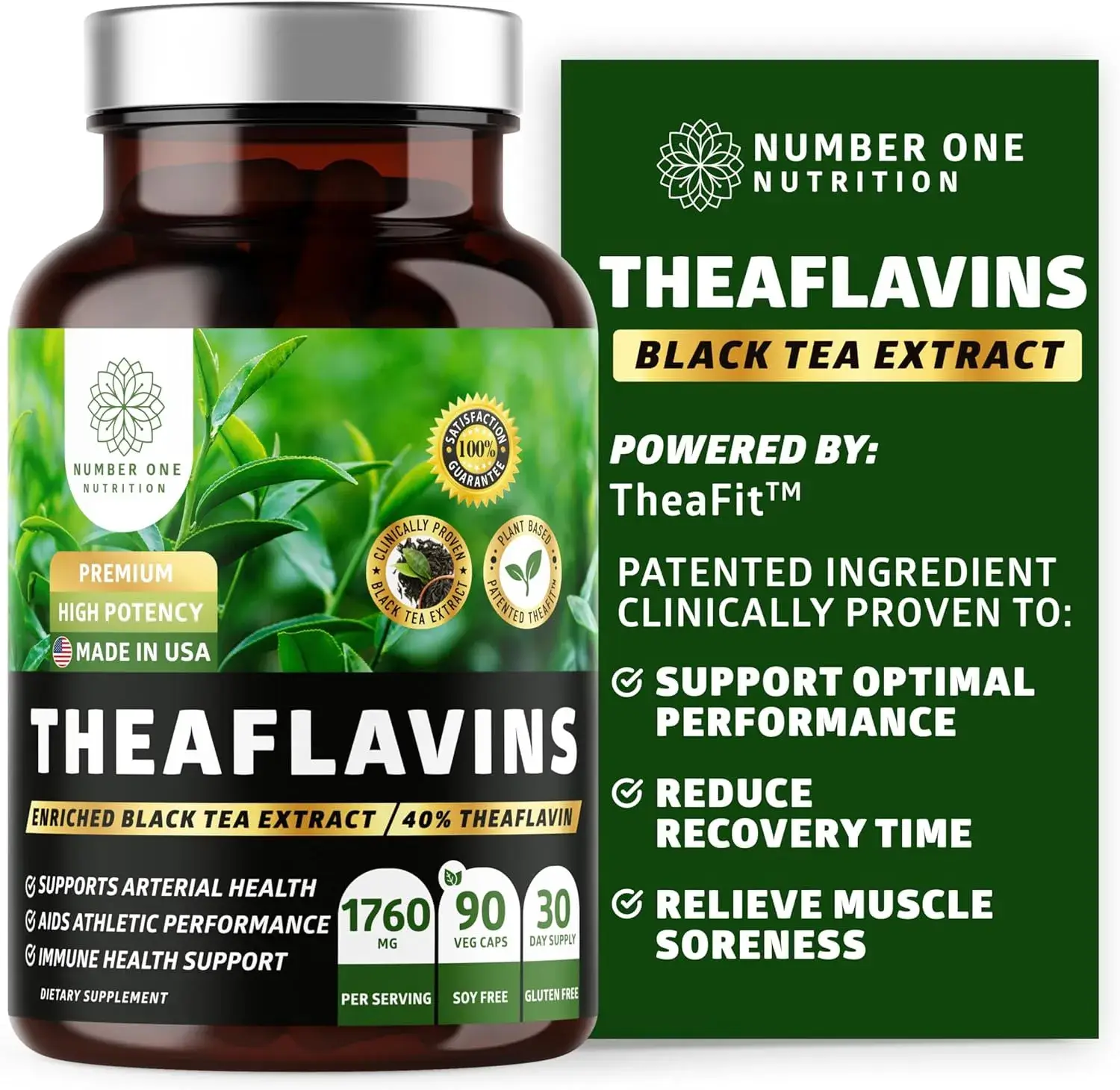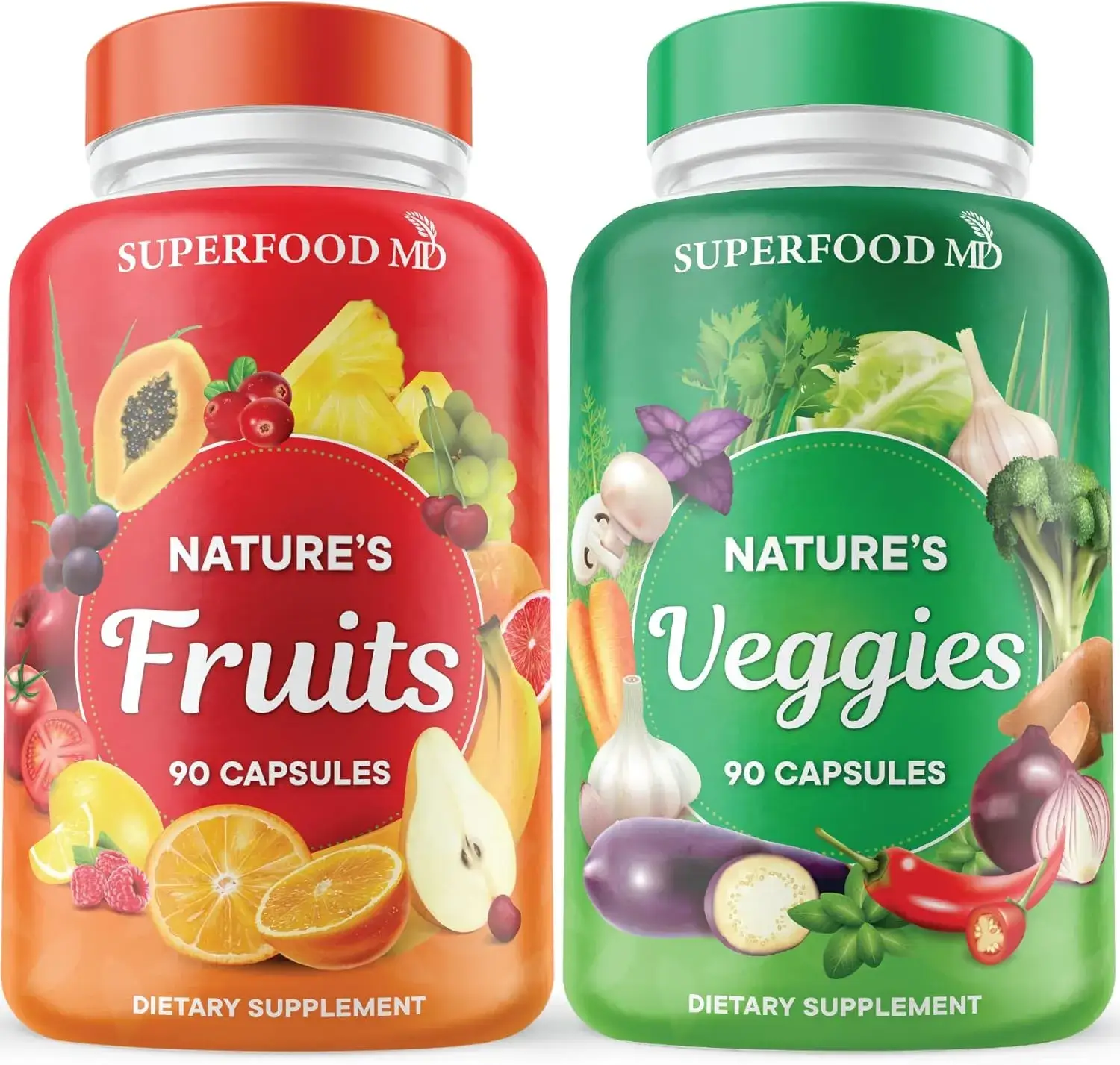Table of Contents
You know, I’ve been hearing a lot about hibiscus tea lately. It’s that bright red, floral drink that tastes a bit like cranberry. People often wonder hibiscus tea is good for what, and honestly, I was curious. So, I did a little digging to see what the fuss is about. Turns out, this tea might actually be a pretty good addition to your daily routine if you’re looking to support your health in a few different ways. It’s not a magic cure-all, of course, but there are some interesting benefits that make it worth trying.
Key Takeaways
- Hibiscus tea is packed with antioxidants that help your body fight off damage from unstable molecules.
- Studies suggest hibiscus tea may help lower blood pressure, which is good for heart health.
- Some research indicates hibiscus tea could play a role in managing cholesterol levels, though more studies are needed.
- This tea might offer support for weight management efforts by potentially reducing body fat.
- Hibiscus tea contains Vitamin C, which can help boost your immune system’s defenses.
Hibiscus Tea’s Impact on Blood Pressure

When we talk about what hibiscus tea does for your body, its effect on blood pressure is pretty significant. High blood pressure can really put a strain on your heart over time, and it’s a known risk factor for heart disease. So, finding natural ways to manage it is always a good idea.
Understanding Blood Pressure Management
Keeping your blood pressure in a healthy range is key for overall well-being. It’s a measure of how hard your heart has to work to pump blood through your body. When it’s consistently too high, it can lead to serious health issues.
How Hibiscus Tea May Lower Blood Pressure
Studies suggest that drinking hibiscus tea might help lower both systolic and diastolic blood pressure. Some research indicates that regular consumption could lead to a noticeable drop in these numbers compared to a placebo. It’s thought that the compounds in hibiscus might help relax blood vessels, which in turn can lower pressure.
- May reduce systolic blood pressure.
- May reduce diastolic blood pressure.
- Contains compounds that might relax blood vessels.
While the exact mechanisms are still being explored, the consistent findings across several studies point to hibiscus tea as a potentially helpful beverage for blood pressure management.
Considerations for Those on Blood Pressure Medication
If you’re currently taking medication to manage your blood pressure, it’s really important to chat with your doctor before adding hibiscus tea to your routine. There’s a possibility that hibiscus tea could interact with these medications, potentially causing your blood pressure to drop too low. It’s always best to get professional advice to ensure your health plan is safe and effective.
Hibiscus tea is one of the many uses for hibiscus tea that people are exploring. It’s fascinating to see what hibiscus tea does for your body in terms of these subtle but important physiological changes. These ways hibiscus tea improves well-being are definitely worth noting.
👉 Discover the premium hibiscus tea with powerful proven health benefits 👈
Antioxidant Powerhouse of Hibiscus Tea
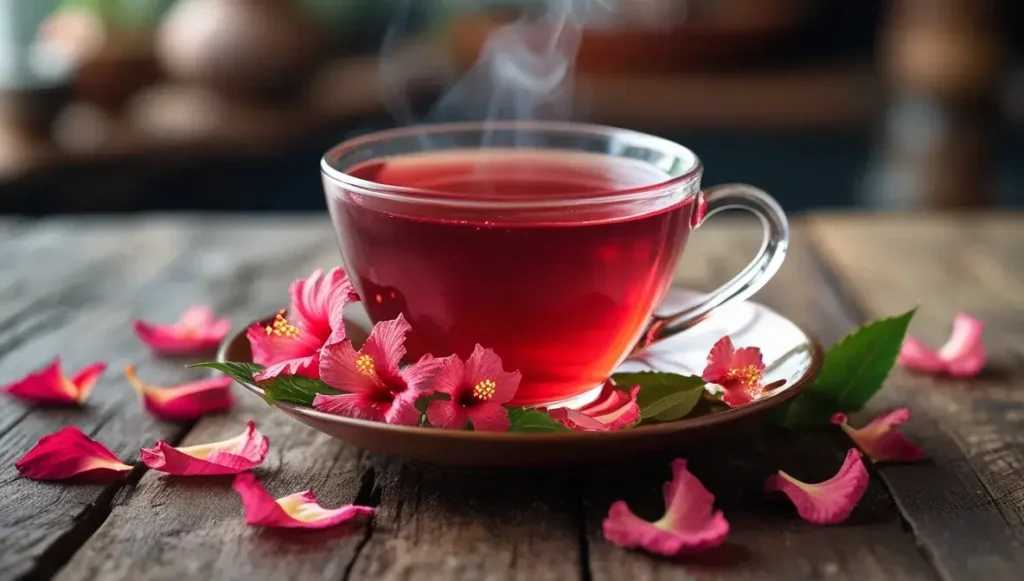
The Role of Antioxidants in Health
Think of antioxidants as your body’s personal security team. They’re these amazing compounds that work to protect your cells from damage caused by unstable molecules called free radicals. When free radicals build up, they can cause what’s known as oxidative stress, which is linked to aging and a whole host of health issues, from heart disease to certain cancers. Basically, keeping these free radicals in check is pretty important for staying healthy.
Hibiscus Tea’s Rich Antioxidant Profile
This is where hibiscus tea really shines. It’s absolutely loaded with antioxidants, particularly anthocyanins, which give the tea its vibrant ruby color. Some research even suggests that hibiscus tea has a higher antioxidant content than some other popular teas, like green tea. It’s a fantastic way to get more of these protective compounds into your diet.
Combating Free Radicals and Oxidative Stress
So, how does this translate to actual benefits? By providing your body with a steady supply of antioxidants, hibiscus tea can help neutralize those harmful free radicals. This means it can potentially help reduce cellular damage and the effects of oxidative stress. For those looking for natural remedies hibiscus tea offers, this antioxidant boost is one of the key benefits of drinking hibiscus. It’s like giving your body a little extra armor to fight off daily wear and tear.
Hibiscus Tea and Cardiovascular Health

When we talk about keeping our hearts happy and healthy, hibiscus tea often pops up. It’s pretty interesting how this vibrant drink might play a role in our cardiovascular well-being. The health advantages of hibiscus tea are quite varied, and its impact on heart health is definitely one of the big ones people are curious about. It’s not just about one thing; it’s a combination of properties that make drinking hibiscus tea for health a good idea for many.
Cholesterol Level Support
So, what is hibiscus tea good for when it comes to cholesterol? Some research suggests that hibiscus tea could help manage cholesterol levels. Studies have looked into how it affects both HDL (the good kind) and LDL (the bad kind) cholesterol, as well as triglycerides. While the results aren’t always super clear-cut across all studies, there’s a promising trend. For instance, some research indicates that regular consumption might lead to an increase in HDL cholesterol and a decrease in LDL cholesterol and triglycerides. This is a pretty significant finding because keeping these levels in check is a big part of reducing risks associated with heart disease.
Reducing Risks Associated with Heart Disease
Beyond cholesterol, hibiscus tea’s health properties might offer broader protection against heart disease. One of the most talked-about hibiscus tea benefits is its potential to help lower blood pressure. High blood pressure puts a lot of strain on your heart over time, making it work harder and increasing the risk of heart problems. By potentially helping to bring blood pressure down, hibiscus tea contributes to a healthier cardiovascular system. It’s like giving your heart a little bit of a break.
The Link Between Hibiscus and Heart Well-being
Ultimately, the combination of potential cholesterol management and blood pressure support points to a positive link between hibiscus tea and overall heart well-being. It’s one of those natural ways to support your body’s systems. While it’s not a magic cure-all, incorporating hibiscus tea into a balanced lifestyle, alongside a good diet and exercise, could be a beneficial step for many. The hibiscus tea health advantages are definitely worth considering if you’re looking for ways to support your heart health naturally. It’s a simple addition that might offer significant health benefits for health.
👉 Experience the ultimate hibiscus tea for revolutionary daily energy boost 👈
Potential Benefits for Weight Management
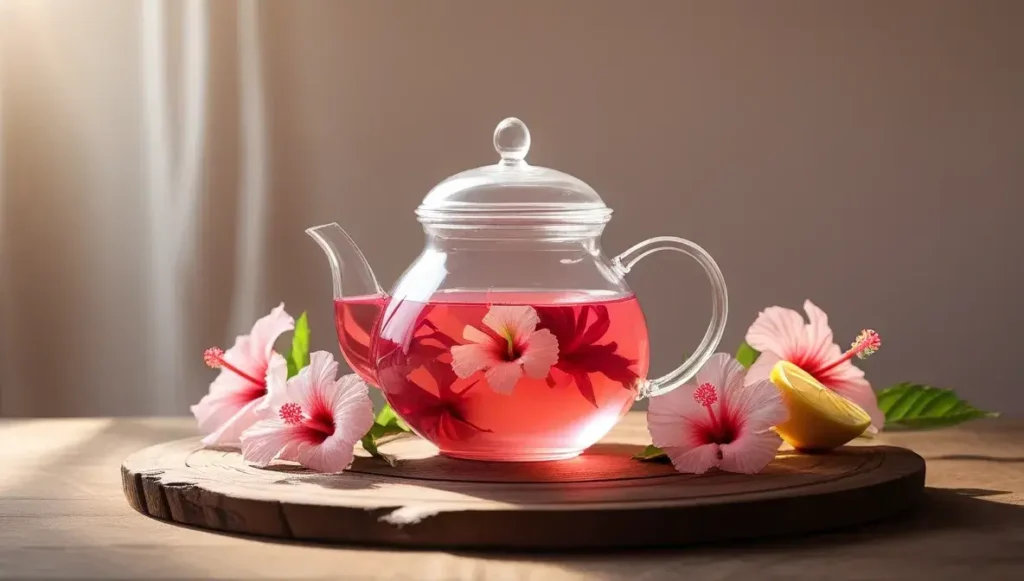
So, you’re looking to shed a few pounds, huh? It’s a common goal, and while there’s no magic bullet, some natural helpers can make the journey a bit smoother. Hibiscus tea is one of those things people are talking about when it comes to weight management. It’s not a miracle cure, mind you, but there’s some interesting research suggesting it might lend a hand.
Hibiscus Tea’s Role in Body Fat Reduction
Studies, though often small and needing more follow-up, have hinted that hibiscus extract might help reduce body fat. One particular study showed a decrease in body weight, body fat percentage, and BMI after about 12 weeks of consistent use. It’s thought that compounds in hibiscus might play a role in how your body processes fat, but honestly, the exact mechanisms are still being figured out. It’s definitely not a replacement for a healthy diet and exercise, but it could be a nice addition.
Impact on Body Weight and BMI
Beyond just fat, some research points to hibiscus tea helping to lower overall body weight and body mass index (BMI). Imagine sipping a tart, refreshing drink that, over time, might contribute to a healthier number on the scale. It’s pretty neat when you think about it. The tea itself is also naturally low in calories, which is a big plus when you’re trying to manage your weight. You get flavor without a lot of the sugar and calories you’d find in other beverages.
Lifestyle Changes and Hibiscus Tea
It’s really important to remember that hibiscus tea is best viewed as a supportive player in a larger weight management strategy. True, lasting weight loss comes from a combination of eating well and moving your body regularly. Think of hibiscus tea as a little extra boost, a way to potentially support your efforts. So, while you’re focusing on balanced meals and getting your steps in, enjoying a cup or two of hibiscus tea could be a pleasant and potentially beneficial part of your routine. It’s all about making sustainable changes that work for you.
Supporting Immune System Function
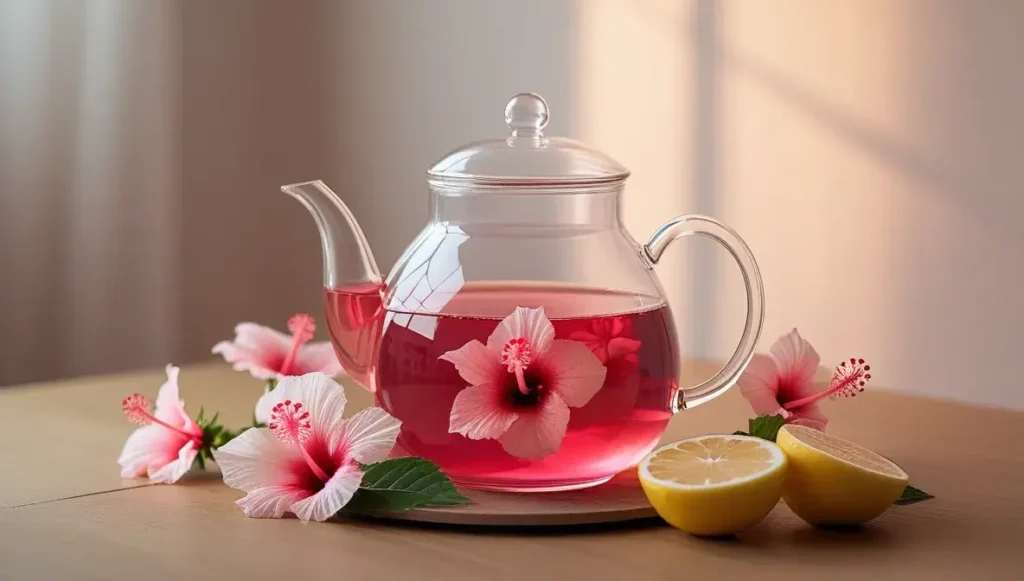
Feeling a bit run down? Maybe it’s time to reach for a warm cup of hibiscus tea. This vibrant drink isn’t just tasty; it’s packed with goodies that can give your immune system a helpful nudge. Think of it as a little support system in a mug.
Vitamin C Content in Hibiscus Tea
One of the stars in hibiscus tea is Vitamin C. You know, that vitamin everyone talks about when cold and flu season rolls around? Well, hibiscus tea has a decent amount of it. Vitamin C is pretty important for keeping your immune cells working right. It helps them do their job of fighting off germs and keeping you healthy. It’s like giving your body’s defense team a little pep talk.
Fending Off Seasonal Illnesses
Because of that Vitamin C, and other compounds in hibiscus, this tea can be a good ally when the seasons change and bugs start going around. It’s not a magic shield, of course, but having it regularly might just help your body be a bit more prepared to handle whatever sniffles or coughs are floating around. It’s a nice, gentle way to support yourself.
Boosting Overall Bodily Defenses
Beyond just Vitamin C, hibiscus tea also contains other bits and pieces, like antioxidants, that contribute to your body’s general well-being. These can help protect your cells from damage, which in turn supports a more robust immune response overall. So, while you’re enjoying the tart, fruity flavor, you’re also doing something good for your body’s natural defenses. It’s a win-win, really.
👉 Taste our exclusive hibiscus tea crafted for elite tea lovers 👈
Exploring Hibiscus Tea’s Effect on Liver Health
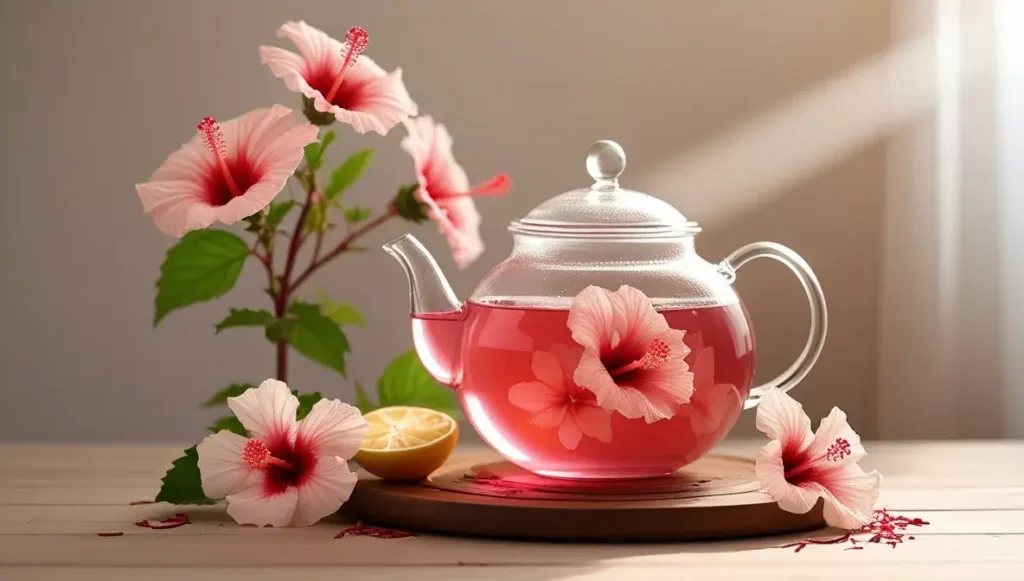
Your liver does a lot of important work, like making proteins and helping your body break down fats. Keeping it healthy is pretty key to your overall well-being. Turns out, hibiscus might actually help your liver do its job better.
Protecting Against Liver Damage
Some studies, mostly done on animals, suggest that hibiscus could offer some protection for your liver. For instance, one study showed that giving hamsters hibiscus extract seemed to lower markers that indicate liver damage. It’s interesting stuff, and while it’s not directly about the tea, it hints at a potential benefit.
Enhancing Detoxifying Enzymes
There’s some evidence that hibiscus might help your liver out by boosting the enzymes responsible for detoxification. Think of these enzymes as your liver’s cleanup crew. While the research often uses concentrated hibiscus extract, it’s a promising area that suggests the plant could support your liver’s natural processes.
Potential for Liver Steatosis Improvement
Liver steatosis, which is basically when fat builds up in your liver, can be a serious issue. A small study involving people who were overweight found that taking hibiscus extract for a few weeks actually helped improve this condition. It’s a small piece of the puzzle, but it points towards hibiscus having a positive effect on managing liver fat.
Antimicrobial Properties of Hibiscus
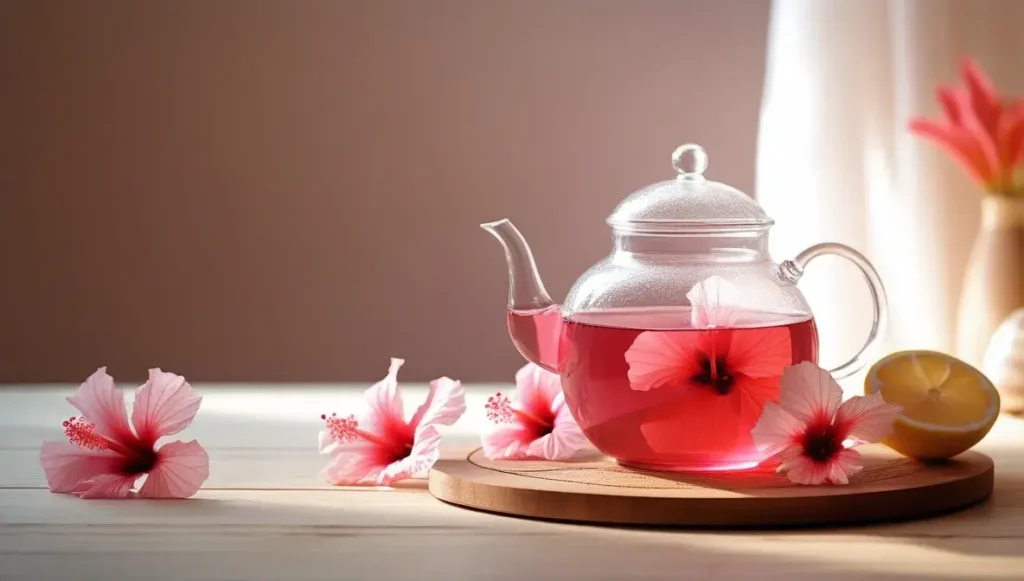
You know, sometimes the simplest things in nature turn out to be pretty amazing. Hibiscus tea, that vibrant ruby-red drink, is one of those things. Beyond its tart, refreshing taste, it seems to have some real power when it comes to keeping unwelcome microbes at bay. It’s like a natural bodyguard for your body.
Inhibiting Bacterial Growth
So, what’s the deal? Well, studies, mostly done in labs with concentrated hibiscus extracts, suggest that this plant can actually put a damper on the growth of certain bacteria. Think about common bacteria that can cause things like stomach upset or even more serious infections. Hibiscus appears to interfere with their ability to multiply. It’s not a magic bullet, of course, but it’s pretty neat to think a tea could offer this kind of support.
Fighting Against Specific Bacteria Strains
What’s even more interesting is that research has pointed to hibiscus being effective against specific types of bacteria. For instance, some lab work showed it could slow down E. coli, a bug that can really mess with your digestive system. Other studies have looked at its effect on a handful of different bacterial strains, and the results were quite promising, sometimes even comparing favorably to certain conventional treatments. It really highlights the potential of natural remedies hibiscus has to offer.
Hibiscus Tea as a Natural Aid
When you put it all together, the health properties of hibiscus tea suggest it could be a helpful addition to your wellness routine, especially if you’re looking for natural ways to support your body’s defenses. While we definitely need more studies done with actual people drinking the tea to confirm these effects, the early signs are pretty encouraging. It’s a tasty way to potentially give your body a little extra help against those tiny invaders.
So, Hibiscus Tea Is Good for What — Should You Try It?
Overall, hibiscus tea seems like a pretty good drink to add to your routine. It tastes nice, kind of like cranberry juice, and it’s packed with stuff that’s good for you, like antioxidants. People have been looking into it, and it might help with things like blood pressure and maybe even cholesterol. Plus, it’s caffeine-free, which is a win for a lot of people. Just remember, like with anything, it’s probably best to chat with your doctor before you start drinking it regularly, especially if you’re on any medications or have specific health conditions. But for most folks, a warm cup of this bright red tea sounds like a tasty way to potentially boost your well-being.
👉 Enjoy the superior hibiscus tea with breakthrough health benefits today 👈
Frequently Asked Questions
What exactly is hibiscus tea?
Hibiscus tea is made by steeping dried parts of the hibiscus plant, usually the colorful, petal-like calyces, in boiling water. It has a bright red color and a tangy flavor often compared to cranberries. You can enjoy it hot or chilled.
Why are antioxidants in hibiscus tea important?
Hibiscus tea is packed with antioxidants, which are like tiny bodyguards that help protect your cells from damage caused by unstable molecules called free radicals. This can help keep your body healthy and might even slow down aging.
Can hibiscus tea really help lower blood pressure?
Yes, studies suggest that drinking hibiscus tea might help lower blood pressure. It’s thought to work by helping blood vessels relax. However, if you’re already on blood pressure medication, it’s a good idea to chat with your doctor before adding hibiscus tea to your routine.
Does hibiscus tea help with losing weight?
Some research indicates that hibiscus tea could be a helpful addition to a weight loss plan. Studies have shown it might help reduce body fat and overall weight, but it works best when combined with healthy eating and exercise.
How does hibiscus tea help my immune system?
Hibiscus tea contains Vitamin C, which is known to support your immune system. This vitamin helps your body fight off infections and can be especially helpful during times when colds and flu are common.
Are there any risks or side effects to consider with hibiscus tea?
While hibiscus tea has many potential benefits, it’s important to be aware of possible side effects. It might interact with certain medications, affect blood pressure or blood sugar levels, and isn’t recommended for pregnant or breastfeeding women. Always consult your doctor if you have health concerns or are taking medications.
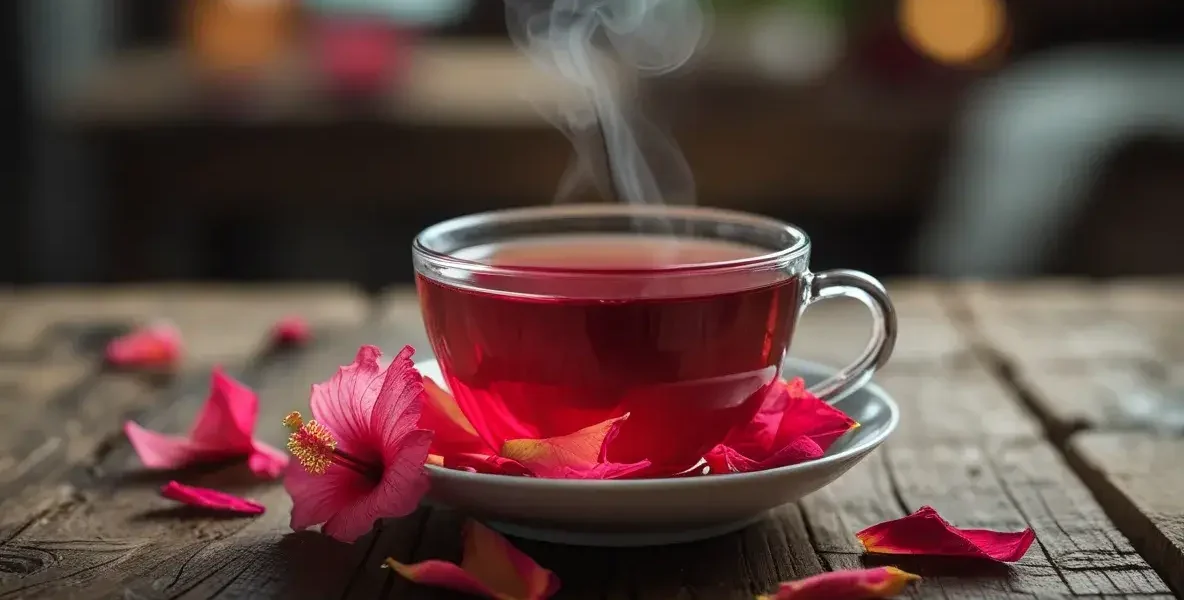

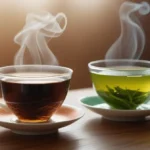



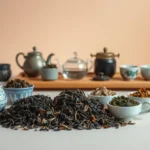

![Jasmine Tea vs Green Tea Benefits: Which Gives Better Health Results? [2025] jasmine tea vs green tea benefits](https://www.goteaworld.com/wp-content/uploads/2025/09/jasmine-tea-vs-green-tea-benefits-150x150.webp)
